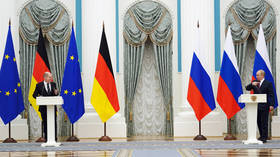Kremlin addresses reports about Putin-Scholz talks

Berlin has not requested a telephone conversation between Chancellor Olaf Scholz and Russian President Vladimir Putin, Kremlin spokesman Dmitry Peskov stated on Wednesday. German newspaper Die Zeit had reported that Scholz wanted to speak with Putin by phone ahead of the November G20 meeting in Brazil.
According to Peskov, Putin and Scholz currently have “no common issues” to discuss. Relations between Germany and Russia have been “reduced to virtually zero” on the “initiative of Berlin and other EU capitals,” the Kremlin spokesman told journalists.
”The president [Vladimir Putin] has repeatedly said he’s open to dialogue,” Peskov said. He also noted that Putin and Scholz last had contact in December 2022.
The German Chancellor has been endorsing diplomatic efforts to end the Ukraine conflict, suggesting in September that Moscow be invited to any future peace summit.
In June, Switzerland hosted the first Ukraine peace conference and it took place without Russia’s participation. Moscow described that event, which focused solely on Ukrainian leader Vladimir Zelensky’s ‘peace formula,’ as a “parody of negotiations.”
Germany is Ukraine’s second-largest military donor after the US. Berlin has provided or pledged more than €28 billion ($31 billion) in arms to Kiev since the escalation in early 2022 of the neighboring states’ long-running conflict, according to data from the Federal Government website.
Berlin, however, has refused to provide long-range missiles to Ukraine or to consider the use of such weapons for Ukrainian strikes deep into Russia. The issue is currently being debated by Ukraine’s backers, with Washington and London suggesting that they could allow Kiev to use missiles such as American-made ATACMS and British-made Storm Shadows to hit targets deep inside Russian territory.
In June, Putin pledged that Moscow would shoot down any missiles used in long-range strikes, and retaliate against those responsible. Last week, Putin proposed updates to Russia’s nuclear doctrine, which would allow the use of nuclear weapons in response to such vicarious strikes on Russian territory.














